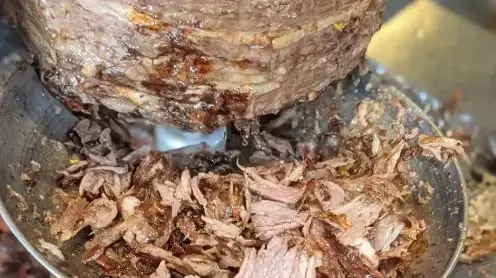column
Dönerbetreiber are really brave people. No matter how remote the village is, no matter how many bald heads move around, there is always a brave doner ken , who settles on site. National liberated zone? Ideal for the kebab sale! Germany is populated everywhere by Kebapbuden and would be stuck without them. In many areas they are the only shops that still open at night and supply the people. Unfortunately, non-sober, non-pacifist customers are part of everyday life.
What many do not know: The history of German unity and the Turkish roast are closely intertwined. Many East Germans associate the fall of the Berlin Wall with the taste of doner kebab. With their welcome money in West Berlin, they first turned to the Turks and fell hopelessly in the folding coffin with garlic sauce. The food service operators saw the long lines and realized: Also the Ossi loves doner kebab. So many set out after the turn to sell the Bosphorus burger in the German East. Whether Cottbus, Chemnitz or Hoyerswerda - the Turkish and Kurdish pioneers have been doing important integration work for years.
The journalist and sociologist Eberhard Seidel describes the Anatolian "Gold Rush in the East" in his book "Aufgespießt: How the Döner got over the Germans". Seidel is probably the largest kebab expert in the Federal Republic. And because the rotisserie is still so popular, but his book from 1996 and out of print, he is currently working on a new edition.
Following the terrorist attack a week ago in Halle, Seidel wrote on Facebook:
"The attack on the kebab store in Halle was of course no coincidence as the attack on the synagogue.The fight of the neo-Nazis for a homogenization of food culture in East Germany has been ongoing since 1990. There is a thirty-year continuum of violence with well over 1,000 Attacks against ethnic catering institutions [...]. "According to Seidel, this number is a "conservative estimate". Since there is no official information, he has added and extrapolated cases. In reality, the number is probably much higher, especially if you include the abuses in the West and "harmless" as swastika graffiti. But even without official statistics Anatolian food service operators know about the danger of their work. Where do you get the courage to sell Kebap in remote places?
Presumably, they rely on an unspoken codex between kebab dealers and neo-Nazis: The latter hate Turks, but - like all Germans - they love doner kebab. You know, who wants Kebap, must let McMustafa live. The dilemma of the Nazi Döner Codex is that many would-be Aryans are ashamed of their treachery while feasting on Oriental seduction. Because they secretly fear that the takeaway operator is a harbinger of change: first comes someone who sacks meat on the spit, then thousands come with sabers and move not only the sausage on the pelage.
Seen in this way, the kebab is a litmus test of German democracy. Whoever eats it without being ashamed or firing has arrived in the modern age. For Nazis, however, the Anatolian spit roast is a constant danger. He resembles a multicultural siren song, which turns the Teutonic palate off the right path.
That's why the Freizeitfaschos sometimes riot at the Kebapbude, Kodex or no. As Volksdeutsche, who "defend themselves" against the ethnic extinction of their own race (from the point of view of the Nazis, everything runs under self-protection), the NSU murderers shot at least twice in food stalls. Her nail bomb attack in the Cologne Keupstraße was later commented in the Bekennervideo with "Today action doner spit".
So let's come to the incidents in Halle. The second target of the armed assassin, who actually wanted to storm into a synagogue, was no coincidence. He wanted to shoot at least kayaks - if not Jews - by the way, not the first this year. When he sees the takeaway, he says according to the camera recording: "Doner, oh yeah." But who storms into a kebab to terrorize Kanaken, has not understood one thing: There usually sit no Anatolier. There are Germans eating. Like the poor construction worker who was murdered.
To local history:
"Doner kebab" is Turkish and means something like "rotating spit roast". As we know him - with greens, herbs and red-white sauces - he was invented in Berlin in the 1970s. Real Turks eat spit roast in a different way. Doner is therefore a German national dish. In view of the enormous consumption of kebab - two million a day, despite several meat scandals - one can even say: he is a piece of German Leitkultur. The German government also sees it that way and advertises in its new united campaign "This is sooo German" with a doner motive. Of course, rights in the net are already busy.
Last week, Federal Interior Minister Horst Seehofer declared that he wants to monitor Jewish institutions more closely in the future. This is absolutely correct given the growing anti-Semitism and in response to the Halle terrorist attack. But where are the safety precautions for mosques and kebab shops? Should they continue to be easy target targets?
So that Döneressen will not be a test of courage in the future, I propose the following: Until the federal government submits a comprehensive master plan against right-wing extremism, we could introduce a new day of protest a week. Since Monday and Friday are already taken, I plead for Thursday, the Dönerstag for diversity . Once a week, all people who are in favor of an open society should symbolically eat a kebab. If you refuse meat, take Dürüm with feta or roasted vegetables. Of course, falafel, shawarma and gyros are also valid. It's about the symbol.








